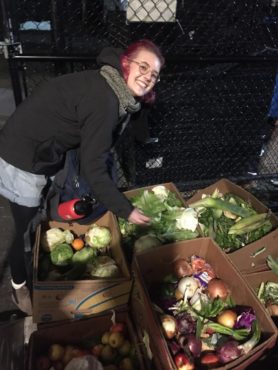Today — Monday, Jan. 14 — marks day seven of the UVic students’ challenge

Riley Yakabuski stands beside boxes of tossed produce. Provided photo by Elora Adamson.
As garbage bins fill with food waste in urban centres across the country, the stomachs of people living in northern Canada are left empty.
For UVic environmental studies students Elora Adamson and Riley Yakabuski, this contradiction is unacceptable. To raise awareness and money for the Indigenous Inuit communities facing food insecurity in Northern Canada, the two are eating only food items they can find in dumpsters for ten days. Today — Monday, Jan. 14 — marks day seven of their feat.
At the end of the ten-day pledge, they will be donating the money they would have normally spent on groceries to Feeding Canada, an Indigenous-led grassroots group that seeks to “feed as many Northern Canadians as possible.”
Adamson and Yakabuski have also started a GoFundMe page to encourage others to donate to the cause.
By temporarily forfeiting their privilege of purchasing food from the grocery store, they hope to feed the two birds of food waste and food insecurity in the north with one scone.
“I’ve been wanting to do this for a long time,” says Adamson, who first came to Yakabuski with the idea. “The connection between food security in the north and dumpster diving and food waste was a way we could … highlight both problems simultaneously.”
Both Adamson and Yakabuski are members of the Community Cabbage, a food-rescue initiative at UVic that provides a meal to students every week by salvaging and cooking food that would have otherwise gone to waste.
The amount of food waste thrown out every year in Canada is equal to about one million full-grown male elephants.
“We are here [in Victoria] drowning in so much food that we can’t even eat or hand out to people. We can’t even take all the waste that we see when we go to dumpsters,” says Yakabuski.
“60 per cent of children in Nunavut come from food insecure houses,” they cite on their GoFundMe page, according to the non-profit advocacy organization Feeding Nunavut.
And while Inuit communities struggle to make nutritional ends meet, the amount of food waste thrown out every year in Canada is equal to about one million full-grown male elephants.
For Yakabuski, food insecurity in the north is part of a greater, systemic problem. After taking a Canadian history course at UVic, she realized how colonialism has created a cycle of dependency that is at the root of the issue.
“[European colonizers and settlers] ended up depleting so much of the resources that the Inuit people depended on that … it caused them to relocate a lot of the time,” Yakabuski says. “They’ve [become] dependent on colonial food sources and imported food sources.”
Europeans first showed up on Inuit territory in the mid-16th century, but the 20th century was when the greatest colonial impacts on Inuit food security took place.
With a reliance on imported food, Inuit people are at the mercy of market and shipping prices, which tend to make food in northern Canada three times more expensive than the national average, if not higher, says Adamson.
And the healthier and fresher the food, the less accessible it is, she adds.
Yakabuski acknowledges that the federal government has been seeking to address the issue of healthy food accessibility with its Nutrition North Canada (NNC) subsidy program, but that it’s not working.
“The subsidy [program] is designed to make healthy foods less expensive, but the way that it is being implemented is not resulting in a significant enough impact that food is being made affordable,” she says.
“For fresh foods, their highest-priority subsidies go to frozen fruits and vegetables and fresh milk…[but] in the first quarter of 2017, only 28.4 per cent of fresh and frozen produce shipped to the areas that are eligible for the subsidy were recorded as receiving it,” says Yakabuski.
“Food insecurity is nothing new and it has not been getting better.”
Yakabuski also says the areas receiving the subsidies are limited.
“Communities are only eligible for the subsidy if they lack year round surface transportation and they have to have used the Food Mail program,” she says.
The Food Mail program was another subsidy program that ran from the 1960s to 2011, at which time it was replaced by the NNC.
Both students say the federal government has for a long time been dragging their feet on this issue.
“Food insecurity is nothing new and it has not been getting better,” says Adamson.
After six days of scavenging urban waste bins around Victoria, the two students have raised over $1 000 through GoFundMe donations. This doesn’t include the amount they will be donating themselves.
So far, Adamson and Yakabuski haven’t had any trouble finding enough to eat, but figuring out how to cook what they’ve found is another story.
“We started finding a lot of weird things, so we’ve been having to learn how to make things that we normally wouldn’t,” says Adamson.
The three bags of corn flour they found in the dumpster one night was one such “weird thing.”
“We learned how to make corn tortillas and it took like an hour to get it right. It was a real struggle,” Adamson says.
When they spoke with the Martlet, Adamson and Yakabuski were in the middle of eating homemade banana ice cream sweetened with date syrup.
But the cool treat wasn’t doing the trick of calming their nerves that have been frazzled by an unjust food system.
“It’s just frustrating to see how the commercial food system overstocks and wastes when food is something that people need to survive,” says Yakabuski. “And there’s still people going hungry, not only in the north but around the globe.”
To donate in support of this initiative visit https://www.gofundme.com/dumpster-divers-for-northern-food-security.







